
Taking Charge: A Comprehensive Guide to DIY Pest Control
Pest infestations can be a source of frustration for homeowners, but with the right knowledge and proactive measures, you can effectively perform DIY pest control. In this guide, we’ll explore various strategies to help you keep your home bug-free and comfortable.
Understanding the Importance of DIY Pest Control
Before delving into specific methods, it’s essential to understand why DIY pest control is valuable. Taking a proactive approach helps prevent infestations, reduces reliance on harsh chemicals, and allows you to create a healthier living environment. By performing DIY pest control, you take charge of your home’s well-being.
Identifying Common Household Pests
The first step in DIY pest control is to identify the pests you’re dealing with. Common household pests include ants, cockroaches, spiders, rodents, and more. Understanding the habits and preferences of these pests helps you tailor your pest control methods for maximum effectiveness.
Maintaining a Clean and Clutter-Free Environment
A clean home is a less inviting space for pests. Regular cleaning and decluttering deprive pests of hiding spots and food sources. Pay attention to areas such as the kitchen, pantry, and storage spaces. Seal food in airtight containers, promptly clean spills, and eliminate standing water to discourage pests from making your home theirs.
Sealing Entry Points and Cracks
Pests often enter homes through small cracks and openings. Conduct a thorough inspection of your home’s exterior, sealing any gaps in windows, doors, and foundation. Use weatherstripping and caulking to close entry points, preventing pests from finding easy access to your living spaces.
Natural Pest Deterrents
Explore natural pest deterrents that are safe for your family and the environment. For instance, peppermint oil, vinegar, and citrus peels can act as effective repellents. Strategically place these natural deterrents in areas prone to pest activity to discourage them from settling in your home.
DIY Traps and Baits
Create your own traps and baits to capture and eliminate pests. For rodents, consider using humane traps or DIY bait stations with non-toxic bait. Cockroach traps and ant baits can be made with readily available household items. Regularly monitor and replace these traps for ongoing pest control.
Beneficial Insects for Pest Control
Introduce beneficial insects to your garden or home to naturally control pest populations. Ladybugs, spiders, and predatory beetles are examples of insects that feed on common pests. Encourage these allies by providing a habitat that supports their presence.
Essential Oils for Pest Management
Harness the power of essential oils to repel pests. Citrus, eucalyptus, and tea tree oils are known for their pest-repelling properties. Mix a few drops with water and spray in areas where pests are a concern. Not only do these oils act as effective repellents, but they also leave your home smelling fresh.
Regular Monitoring and Maintenance
DIY pest control is an ongoing process that requires consistent monitoring and maintenance. Regularly inspect your home for signs of pests, even if you haven’t noticed an infestation. Address any issues promptly to prevent a small problem from turning into a larger one.
Professional Assistance When Needed
While DIY methods are effective for many situations, there are times when professional assistance is necessary. If your efforts prove insufficient, or if you’re dealing with a severe infestation, consider consulting with a pest control professional. They can assess the situation and implement targeted solutions.
Conclusion: Empowering Homeowners in Pest Control
By performing DIY pest control, homeowners can take proactive steps to create a pest-resistant environment. Understanding common pests, maintaining cleanliness, using natural deterrents, and implementing DIY traps are effective strategies. Visit thietbidinhvithongminh.com for additional insights on maintaining a pest-free home.
Empower yourself with effective DIY pest control strategies to keep your home bug-free. Taking charge of pest management not only ensures a comfortable living space but also contributes to a healthier and more sustainable home environment.
